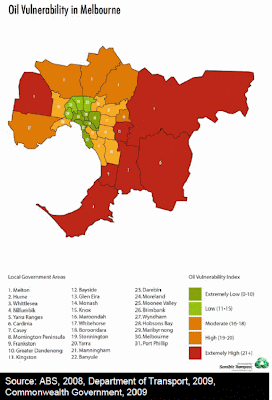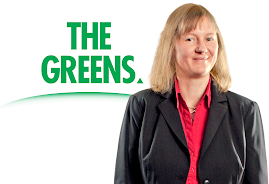
The Greens were proud to support the event and have a long history of campaigning for improved public transport and protection of remnant vegetation.
From left to right: Sue Pennicuik - Greens MLC for Southern Metropolitan Region, Brian Walters - Greens candidate for Melbourne, Colleen Hartland - Greens MLC for Western Metropolitan Region, Samantha Dunn - Greens candidate for Eastern Victoria Region and Colin Long - Greens candidate for South Eastern Metropolitan Region.
The event, a joint action between Save The Pines, SOBA (Save our Bushland Alliance), Friends of Banyule, Green Wedge Coalition, Protector of Public Lands and the Greens. Rod Quantock MC’d the event, a funeral for the death of biodiversity in Melbourne.
The speakers talked about the loss of biodiversity, particularly tragic in this International Year of Biodiversity. The loss of amenity, destruction of heritage sites, the lack of focus on public transport upgrades and over reliance on motor vehicles were also key issues raised against the construction of the road.
Rather than some minor local road upgrades, the government has chosen and expensive and unsustainable transport solution for the people of the peninsula.
 This map shows how vulnerable each municipality in greater Melbourne are to rising oil prices. It is no coincidence that those suburbs with poor public transport options and a reliance on motor vehicles to get around are very vulnerable. Unless there are significant upgrades to public transport these areas will become severely transport disadvantaged in the future.
This map shows how vulnerable each municipality in greater Melbourne are to rising oil prices. It is no coincidence that those suburbs with poor public transport options and a reliance on motor vehicles to get around are very vulnerable. Unless there are significant upgrades to public transport these areas will become severely transport disadvantaged in the future. Once again the people of the Mornington Peninsula are relegated to their cars to rely on as their main mode of transport. A recent projection by the CSIRO showed that Mornington Peninsula was the second highest most vulnerable metropolitan municipality when oil prices rise due to peak oil. The projections showed that people of Mornington Peninsula will be spending a greater proportion of their income on fuel in comparison to those living in inner city suburbs with a good public transport network. Just for the record Cardinia was the most vulnerable municipality whilst Yarra Ranges came in fourth highest.
 Save the Bush included a mock funeral to mark the death of Melbourne's intact remnant vegetation.
Save the Bush included a mock funeral to mark the death of Melbourne's intact remnant vegetation.Residents are keen to see local road upgrades and improvements in public transport as a way to address congestion issues, far more sensible long term solutions. Building roads does not relieve congestion, it only adds to congestion, anyone who’s driven on Melbourne’s freeways over the last decade would realise that.
Congestion costs Victoria an estimated $1.3 to $2.6 billion per annum (VCEC inquiry into Road Congestion 2007/08). The freeway will cut through many reserves in the region including the Pines Flora & Fauna Reserve, Carrum Downs wetlands, Pobblebonk Wetland Reserve, Wittenberg Reserve, Belvedere Reserve & woodlands and the Westerfields Heritage Woodlands.
It is tragic to think that Melbourne’s last intact remnant bush at the Pines Flora & Fauna Reserve will be decimated by the construction of Peninsula Link. A precious piece of bush providing habitat for the endangered Southern Brown Bandicoot amongst many other endangered species.
If the government were genuine about real action on climate change and any action on peak oil, providing real solutions for Melbourne wouldn’t consist on a network of freeways for our city. We don’t need more freeways, we need sustainable transport options.






No comments:
Post a Comment